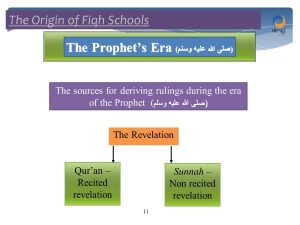Why Scholars Differ (part 2)- What are the Origins of the Fiqhi Schools of Thought

The Origins of the Fiqh Schools
Fiqh at the Time of the Prophet (peace be on him)
During the lifetime of the Prophet (peace be on him) how was fiqh decided?
If someone needed a ruling on a case what did the Prophet (peace be on him) himself do?
The first thing the Prophet (peace be on him) would do was wait for revelation.
The revelation is of two types: Qur’an and Sunnah.
Classifying the Sunnah as revelation might seem strange to some, but nevertheless the Prophet (peace be on him) is the authority – the Rasul Allah, so anything he said is classified as revelation unless it was on worldly matters related to something which is not relevant to rulings.
This is why we have the collection of the Sunnah. The companions would memorise the Sunnah and some of them (not all) used to write the Sunnah.
In the sciences of the hadith is a full course in itself.
Attacking the Sunnah
Refer to the blogs on this:
There are many attacks on the Sunnah these days, and people contesting it, saying ‘Who is Bukhari? We don’t need the Sunnah; we can just stick to the Qur’an.’ It is very dangerous to follow this. The Prophet (peace be on him) warned against this claim so accurately in the hadith:
Verily, I have been given the Qur’an and something along with it, but the time is coming when a man will recline on his couch and hear my hadith and reject it and he will say this is a lie. But this is the Book of Allah. Whatever we find halal in it we accept it and whatever we find haram in it we consider haram. By Allah whatever the Messenger of Allah made haram is like what Allah has made haram. (Tirmidhi)
So the Sunnah should not be denied as long it has been authenticated by scholars.
How do we know when the Sunnah is authentic? This is not your speciality. So refer to the people whose speciality it is and they will tell you. Google is not the authority.
Motivation behind Attacks on the Sunnah
Some people attack the Sunnah simply out of ignorance, as they have read something and wonder how it was possible for 1 million or 600,000 narrations to be collected. It may not be possible for you to have collected that many, but you said someone else couldn’t? There are those whom Allah Almighty gifted with a good memory and the skills to do it. What is impossible for one person is not automatically impossible for others. Allah Almighty has gifted some people with good memory and deep understanding.
When different people read the same ayah from the Qur’an or hadith, they have varying degrees of understanding from it. Some are able to derive 16 different rulings from one short ayah. How did they do this? Someone else might have recited that ayah from childhood, but it never crossed their mind that there could be 16 rulings in that line. When Allah Almighty gifts something to someone, you cannot object to it.
When Sunnah was Collected
It is not true that the Sunnah was collected 300 years after the death of the Prophet (peace be on him). It was compiled in his life time, in the hearts and breasts of the companions. And also on suhuf (scrolls) which were short booklets on which they wrote down the Sunnah on. Ali and Ibn Masoud (may Allah be pleased with them) had one, as did Ibn Omar and Abu Hurairah.
In the very early stage of the revelation the Prophet (peace be on him) forbid the companions to write anything but the Qu’ran because he wanted people to become familiar with the revelation, the blessings, the rhythm and tone of the Qur’an in their life and not to mix it with anything else, as had happened with the previous divine books, which were lost.
Later on, when the companions had become familiar with it, the Prophet (peace be on him) opened the door for them to write down the Sunnah. Once Abdullah ibn Amr asked, ‘Should I write everything I hear from you, Rasul Allah?’ And the Prophet (peace be on him) said:
‘Yes’. He pointed to his mouth and said, ‘Nothing comes out from my mouth but the truth’. (Bukhari)
The confusion arises from the fact that Omar bin Abdul Aziz, the mujadid from the 1st century, (whom scholars agree was the first reformer) officially commanded two main scholars to compile the Sunnah. This was the first official compilation. But there were plenty of collections write down before this. The two scholars collated these collections and put them together.
The Status of the Sunnah
Yes the Sunnah is revelation. The Prophet (peace be on him) said:
I have been given the Qur’an and something like it. (Sunan Abi Dawood, Tirmidhi, Musnad Imam Ahmed)
What is the something? It is the Sunnah, which is the interpretation of the Qur’an.
If you can read the Qur’an without the Sunnah, please show the ayah where it is says pray 4 rakah for Asr, or where it says to pay 2.5 percent for zakah? Or where it explains how to perform hajj?
The Process of Revelation and Ijitihad 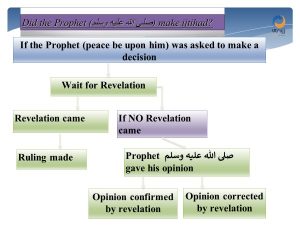
What is ijtihad? Linguistically it means exhausting your efforts. It comes from the root ja-ha-da, which is the same root as jihad, which means ‘trying hard’.
In his lifetime he would wait for the revelation to come down when he asked something, and you can see it in the Qur’an, where ever it says ‘yasalunka…’ (they ask you about…). The companions asked a very limited number of questions, about 13 -16, not 200 – 300. For example, ‘They ask what should they spend’ [2:215], and, ‘They ask you concerning menstruation’ [2:222]. Then the revelation would come and the Prophet (peace be on him) would deliver the ruling.
If the ruling took a long time, he would have to take a decision by himself, and so he would take his own ijtihad (reasoning) The revelation would come and either confirm his opinion or improve it if he was not delivering the best option. We don’t say he made a mistake, we say he chose one option, but there was a better option. E.g. regarding the Badr captives. He did not commit a mistake but did khilaf al awla (chosen the less preferred option, when both were good) .
Thus the revelation would respond sometimes and at other times would leave it open for his ijitihad. There are more than 2-3 theses on the Prophet’s (peace be on him) ijtihad which is part of usool ul fiqh (the principles of fiqh).
There is always a chapter on whether the Prophet (peace be on him) made ijtihad himself or was he fully reliant on revelation. He definitely made ijtihad. A sister has written a PhD on the ijtihad of the Prophet (peace be on him) in Arabic which is a very tough topic. And this shows how much there is on the topic if you can write a PhD on it! It’s a beautiful topic.
Why did the Prophet (peace be on him) make Ijtihad? 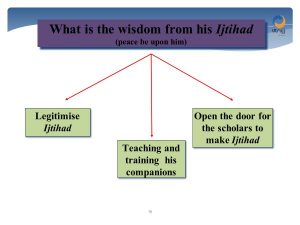
If he was supported by revelation, why did he need to? What was the reason?
The purpose of the Prophet’s (peace be on him) ijtihad was to legitimise the process of ijtihad and a means of teaching people how to do it. He is our role model, so the companions could follow his method and do it as well. And it enabled the scholars who came after to do this too. He opened the door for them to find the rulings on new matters.
And we see he how trained his companions on different occasions how to do ijitihad. He would select those who could do it. Not everyone has the ability to do it. It is a skill which Allah Almighty gives to some people but not everyone. This is why we have exams to see who can go through which speciality – whether it is finance or medicine or law etc. to find out if this is their passion and does they have the ability?
How the Prophet (peace be on him) trained the Mujtahid
Among the mujtahideen whom the Prophet (peace be on him) trained was Muadh ibn Jabal (may Allah be pleased with him). He was sent as a leader on different expeditions and because was trusted for his knowledge to go and deliver. In the very famous hadith: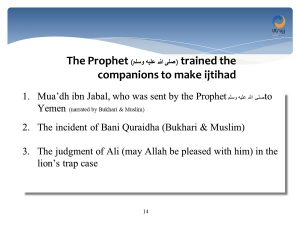
When the Messenger of Allah (peace be on him) intended to send Mu’adh ibn Jabal to the Yemen, he asked: How will you judge when the occasion of deciding a case arises?
He replied: I shall judge in accordance with Allah’s Book.
He asked: (What will you do) if you do not find any guidance in Allah’s Book? He replied: (I shall act) in accordance with the Sunnah of the Messenger of Allah (peace be on him).
He asked: (What will you do) if you do not find any guidance in the Sunnah of the Messenger of Allah (peace be on him) and in Allah’s Book?
He replied: I shall do my best to form an opinion and I shall spare no effort.
The Messenger of Allah (peace be on him) then patted him on the breast and said: Praise be to Allah Who has helped the messenger of the Messenger of Allah to find something which pleases the Messenger of Allah. (Albani)
This shows the approval of the Prophet (peace be on him). He would teach private circles and public circles. And some circles to women and some special circles in his house, or late at night in the mosque, next to his house. Some selected companions would attend these circles. When they were being trained, the Prophet (peace be on him) would allocate tasks for them.
A famous incident which happened in his life time was when they were on their way to Bani Quraiza when they betrayed their covenant with the Prophet (peace be on him). They were going to fight and the Prophet (peace be on him) wanted to go quickly without delay. He said:
When the Prophet (peace be on him) returned from the battle of Al-Ahzab (The Confederates), he said to us, ‘None should offer the ‘Asr prayer but at Bani Quraiza.’ The ‘Asr prayer became due for some of them on the way. Some of them decided not to offer the Salah but at Bani Quraiza while others decided to offer the Salah on the spot and said that the intention of the Prophet (peace be on him) was not what the former party had understood. And when that was told to the Prophet (peace be on him) he did not blame anyone of them. (Bukhari)
This example is a clear instance of the divisions between them – some people are literal and some see beyond the literal meaning and we see this later in the division of the schools.
On another occasion, the Prophet (peace be on him) sent Ali (may Allah be pleased with him) as a judge to Yemen. It is a daunting task for someone so young to be a judge. So the Prophet (peace be on him) tapped him on the chest and said:
Go ahead, Allah Almighty will guide your heart and direct your tongue.
And Ali (may Allah be pleased with him) said that he never hesitated in making a judgement after that. Thus the Prophet (peace be on him) trained and supported them, checked, supervised and observed them, til they were ready to go and deliver.
What was the Source of Ijithad for the Companions?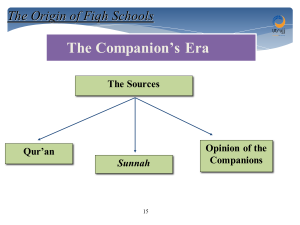
After the death of the Prophet (peace be on him) the companions used Qur’an and Sunnah and their own opinions to determine ahkam (rulings). As in the case of Ali, Muadh and Abdullah bin Masoud (may Allah be pleased with them).
Of course, not every single companion was in that position. There are books on the subject on the ulema us Sahaba, the scholars among the companions. Not all the companions were scholars.
How the Companions Understood Matters
Companion society was a human society. Some of us have inherited a view that they were like angels. They were not. They were human. If they were elevated to an angelic status we could not relate to them. Without doubt they had the privilege of being in the companionship of the Prophet (peace be on him) and be under his guidance. Nothing can match this. But at the end of the day they were humans like us, with mistakes like us and with understanding like us.
Some had deep understanding and some had literal understanding and some were in between. And from there we’ll see the different schools started.
The Birth of the Fiqh Schools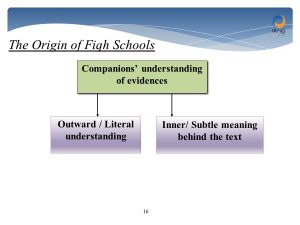
In the first three centuries we see the development of the schools of thought – in Iraq and Hijaz.
In Iraq is well known as the school of the rationalists, or Ahl ra’y whereas the school in Hijaz was well known as the school of traditionalists or Ahl al hadith. This was led by Abu Hanifa, and included Imam Malik. This does not mean they did not follow a rational approach, as this is the terminology used to describe them.
Usually, the Hanafi school is called the school of ra’y as a means of disparaging them and accusing them of only relying on opinion, rather than the Sunnah, which is not true.
In the following period, we have the schools started in the first three centuries by Imam Malik, Shafi, and then Imam Ahmad. Hanbal. Do not think that these were the only schools of thought. We had plenty of other scholars, such as Al Laith bin Saad, Sufyan bin Uyainah, Imam al Auza’i (who was Lebanese!) and he was the same level and at the same era as Abu Hanifa and Imam Malik, and Ibn Abi Layla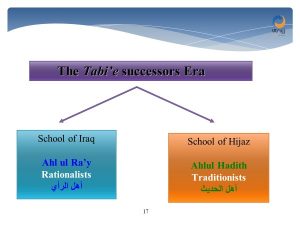
They used to have their own madhabs, but their students were too lazy to develop their schools, and they died out. But they were on that level of ijithad. They were heavy weights at that time.
Those who were served were the four great imams, and Allah Almighty created acceptance for them among people.
As we can see the first four schools fall into the first three generations / centuries. This doesn’t mean we cannot do much after them, but we need to understand our heritage and then plan for our reality and our future insha’Allah.
Abu Hanifa was in the Ummayad dynasty. From his biography, you can see the big divorce between top scholars and the rulers. It is quite common that rulers and scholars do not get on. Abu Hanifa was beaten and passed away in prison. Imam Ahmed was beaten for about 15-20 years in prison. Imam Malik as well was beaten by the ruler. So historically, there has been a clash between politics and scholars. These four schools were created during the two main dynasties – the Ummayads and Abbasids.
If you see the spread of the schools over the globe, you can see the debate Hanafis and Shafis. The Hanbalis are in a minority. Indonesia is dominated by Shafi, and the Indian Subcontinent is Hanafi, the Middle East is half half. It doesn’t matter whether one is Hanafi or Shafi. 
Once upon a time, I myself was an enthusiastic Hanafi. I was teaching comparative fiqh, showing the four schools and then concluding which was the best using the daleel (evidences). So I would lean back nostalgically to Hanafi, and trying my best and having sleepless nights to bring all the evidences to champion the Hanafi. It took four years, and then when I came to London and the penny dropped. The debate is not between Hanafi or Shafi anymore. It’s Islam or no Islam. It is how we keep within the boundaries to protect our youth and ourselves, our dignity and principles. So I changed my perception and approach. It took 20-25 years to reach this point. You learn from experience, the bottom line is to be accepted by Allah Almighty.
There is no such thing as the Hanafi gene! Or Shafi gene. It is not by DNA. We have conditions and etiquettes on how to combine between the schools which we will examine in Part 3.
Course delivered by Shaykh Haytham Tamim on 2nd February 2019.
Related Posts
Why Scholars Differ – the Definition of Shariah and Fiqh
Why Scholars Differ – the Differences between the Fiqhi Schools
Why Scholars Differ – what is ijtihad and taqleed?
Renewing the Deen – Recognising False Claims
Recommended Posts

How Allah strengthens the hearts of believers
April 19, 2024

Don’t be a Ramadani person – Be a Rabbani person.
April 10, 2024

